MGT301A: Ethics and Sustainability Report - Addressing Key Issues
VerifiedAdded on 2023/06/10
|6
|1099
|341
Report
AI Summary
This report identifies and addresses two ethical issues in a business context: employee working conditions and supplier/customer relations. It proposes ethical frameworks for addressing these issues, emphasizing the importance of fair workplace policies, ethical communication, transparency, and honesty. The report suggests implementing consistent workplace policies, providing ethics training, and fostering trust with suppliers and customers. Ultimately, it concludes that addressing ethical challenges through strategies like fair policies and transparent communication is crucial for a company's success and sustainability. Desklib provides access to similar reports and study tools for students.
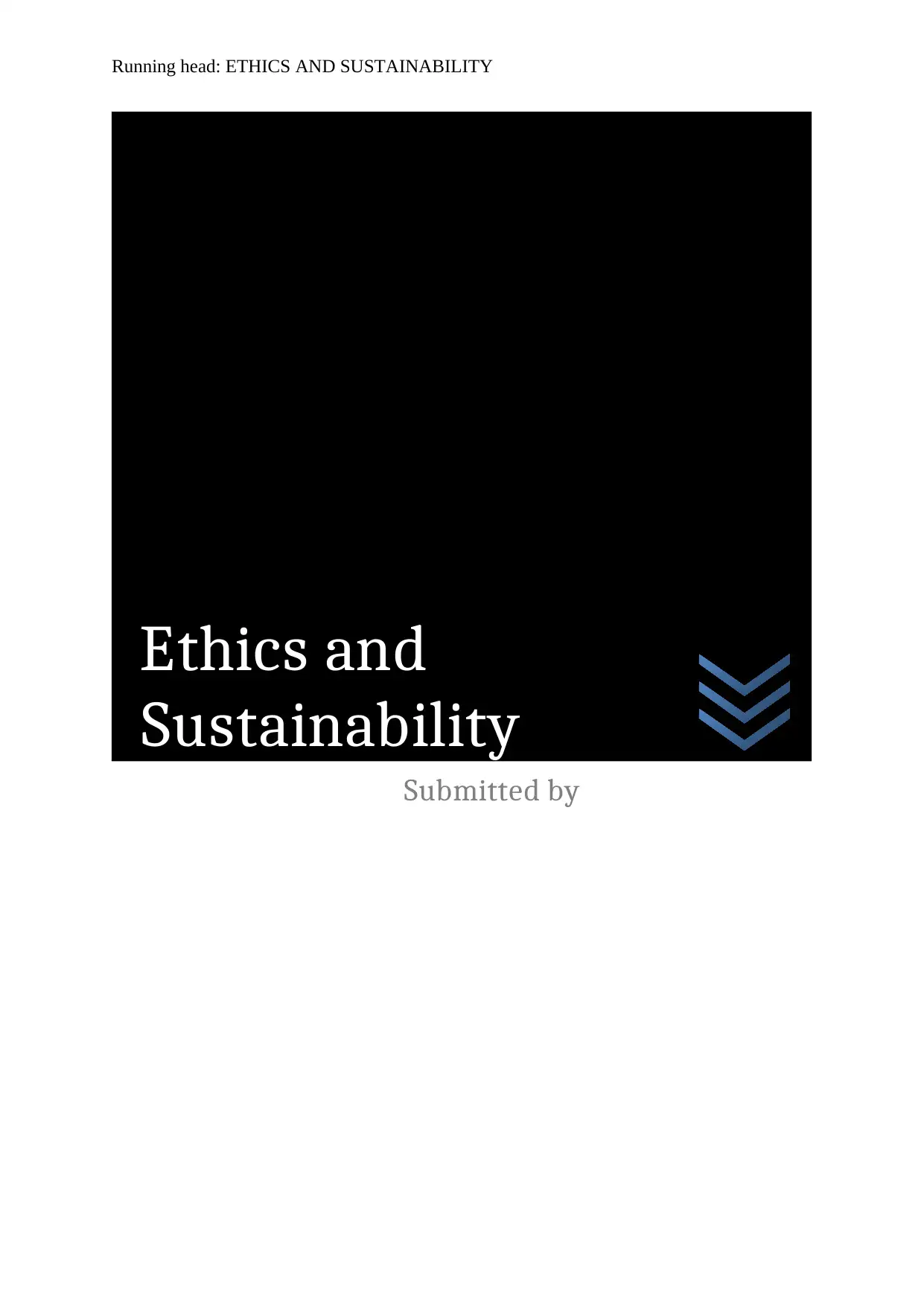
Running head: ETHICS AND SUSTAINABILITY
Submitted by
Ethics and
Sustainability
Submitted by
Ethics and
Sustainability
Paraphrase This Document
Need a fresh take? Get an instant paraphrase of this document with our AI Paraphraser
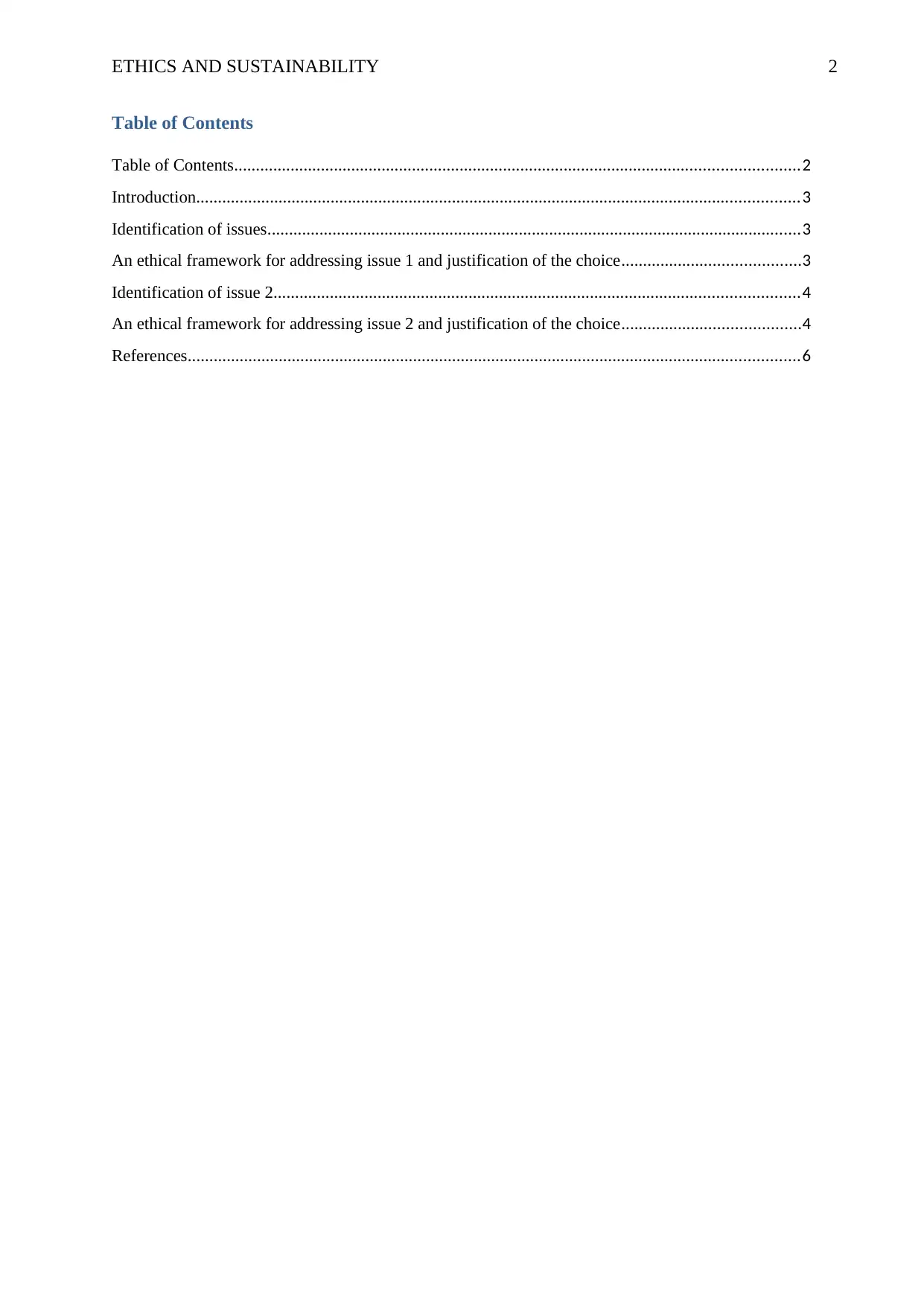
ETHICS AND SUSTAINABILITY 2
Table of Contents
Table of Contents..................................................................................................................................2
Introduction...........................................................................................................................................3
Identification of issues...........................................................................................................................3
An ethical framework for addressing issue 1 and justification of the choice.........................................3
Identification of issue 2.........................................................................................................................4
An ethical framework for addressing issue 2 and justification of the choice.........................................4
References.............................................................................................................................................6
Table of Contents
Table of Contents..................................................................................................................................2
Introduction...........................................................................................................................................3
Identification of issues...........................................................................................................................3
An ethical framework for addressing issue 1 and justification of the choice.........................................3
Identification of issue 2.........................................................................................................................4
An ethical framework for addressing issue 2 and justification of the choice.........................................4
References.............................................................................................................................................6
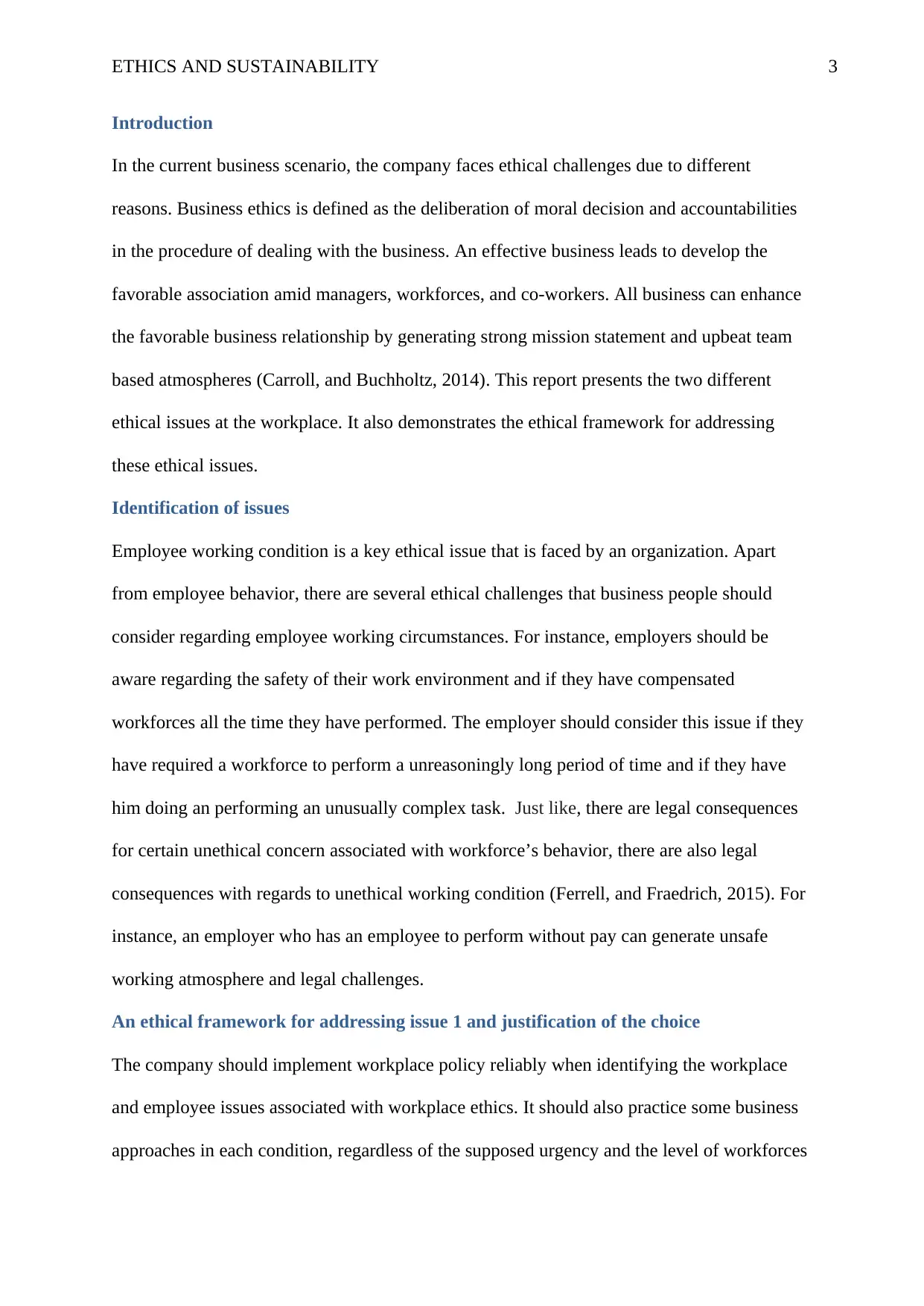
ETHICS AND SUSTAINABILITY 3
Introduction
In the current business scenario, the company faces ethical challenges due to different
reasons. Business ethics is defined as the deliberation of moral decision and accountabilities
in the procedure of dealing with the business. An effective business leads to develop the
favorable association amid managers, workforces, and co-workers. All business can enhance
the favorable business relationship by generating strong mission statement and upbeat team
based atmospheres (Carroll, and Buchholtz, 2014). This report presents the two different
ethical issues at the workplace. It also demonstrates the ethical framework for addressing
these ethical issues.
Identification of issues
Employee working condition is a key ethical issue that is faced by an organization. Apart
from employee behavior, there are several ethical challenges that business people should
consider regarding employee working circumstances. For instance, employers should be
aware regarding the safety of their work environment and if they have compensated
workforces all the time they have performed. The employer should consider this issue if they
have required a workforce to perform a unreasoningly long period of time and if they have
him doing an performing an unusually complex task. Just like, there are legal consequences
for certain unethical concern associated with workforce’s behavior, there are also legal
consequences with regards to unethical working condition (Ferrell, and Fraedrich, 2015). For
instance, an employer who has an employee to perform without pay can generate unsafe
working atmosphere and legal challenges.
An ethical framework for addressing issue 1 and justification of the choice
The company should implement workplace policy reliably when identifying the workplace
and employee issues associated with workplace ethics. It should also practice some business
approaches in each condition, regardless of the supposed urgency and the level of workforces
Introduction
In the current business scenario, the company faces ethical challenges due to different
reasons. Business ethics is defined as the deliberation of moral decision and accountabilities
in the procedure of dealing with the business. An effective business leads to develop the
favorable association amid managers, workforces, and co-workers. All business can enhance
the favorable business relationship by generating strong mission statement and upbeat team
based atmospheres (Carroll, and Buchholtz, 2014). This report presents the two different
ethical issues at the workplace. It also demonstrates the ethical framework for addressing
these ethical issues.
Identification of issues
Employee working condition is a key ethical issue that is faced by an organization. Apart
from employee behavior, there are several ethical challenges that business people should
consider regarding employee working circumstances. For instance, employers should be
aware regarding the safety of their work environment and if they have compensated
workforces all the time they have performed. The employer should consider this issue if they
have required a workforce to perform a unreasoningly long period of time and if they have
him doing an performing an unusually complex task. Just like, there are legal consequences
for certain unethical concern associated with workforce’s behavior, there are also legal
consequences with regards to unethical working condition (Ferrell, and Fraedrich, 2015). For
instance, an employer who has an employee to perform without pay can generate unsafe
working atmosphere and legal challenges.
An ethical framework for addressing issue 1 and justification of the choice
The company should implement workplace policy reliably when identifying the workplace
and employee issues associated with workplace ethics. It should also practice some business
approaches in each condition, regardless of the supposed urgency and the level of workforces
⊘ This is a preview!⊘
Do you want full access?
Subscribe today to unlock all pages.

Trusted by 1+ million students worldwide
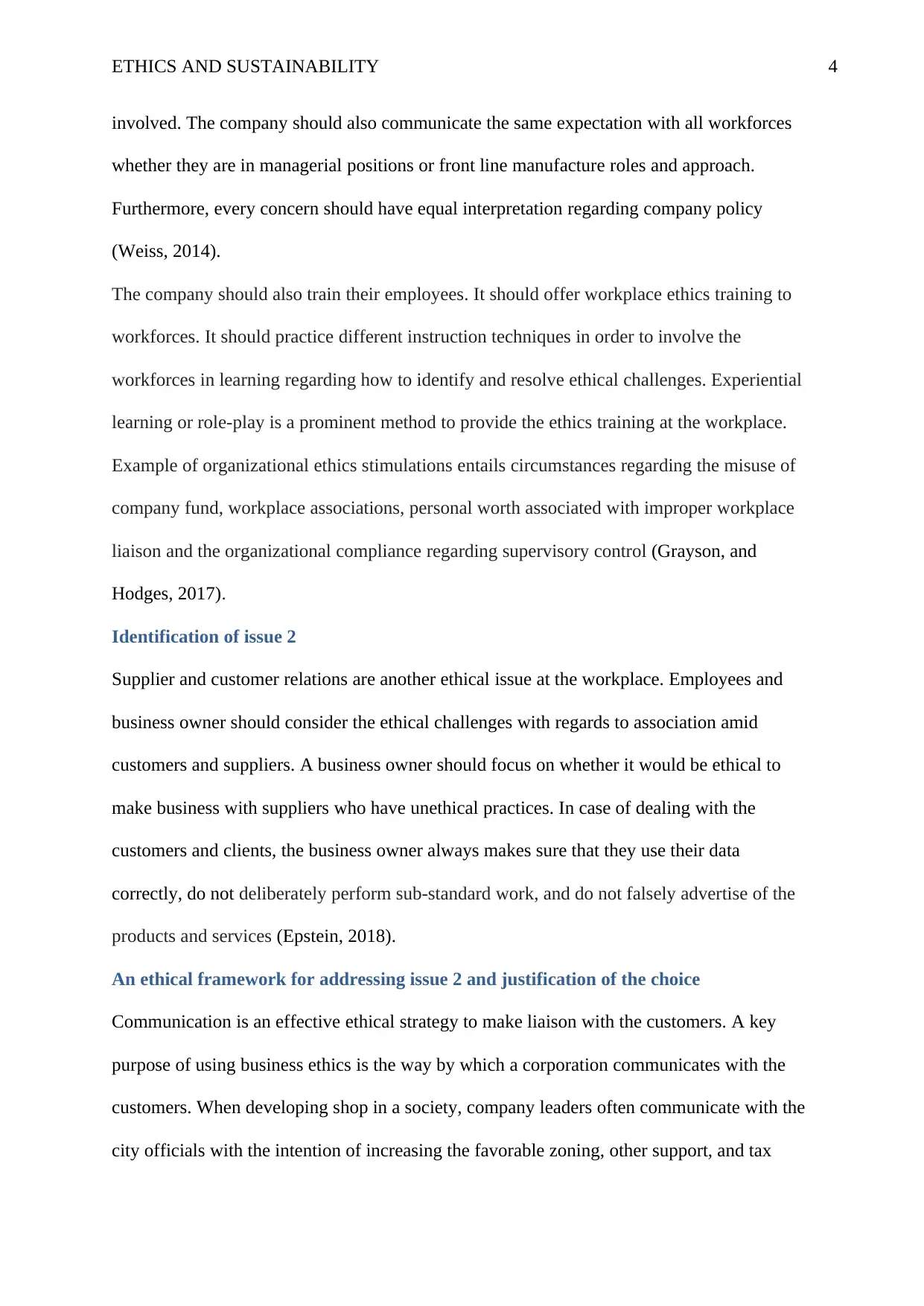
ETHICS AND SUSTAINABILITY 4
involved. The company should also communicate the same expectation with all workforces
whether they are in managerial positions or front line manufacture roles and approach.
Furthermore, every concern should have equal interpretation regarding company policy
(Weiss, 2014).
The company should also train their employees. It should offer workplace ethics training to
workforces. It should practice different instruction techniques in order to involve the
workforces in learning regarding how to identify and resolve ethical challenges. Experiential
learning or role-play is a prominent method to provide the ethics training at the workplace.
Example of organizational ethics stimulations entails circumstances regarding the misuse of
company fund, workplace associations, personal worth associated with improper workplace
liaison and the organizational compliance regarding supervisory control (Grayson, and
Hodges, 2017).
Identification of issue 2
Supplier and customer relations are another ethical issue at the workplace. Employees and
business owner should consider the ethical challenges with regards to association amid
customers and suppliers. A business owner should focus on whether it would be ethical to
make business with suppliers who have unethical practices. In case of dealing with the
customers and clients, the business owner always makes sure that they use their data
correctly, do not deliberately perform sub-standard work, and do not falsely advertise of the
products and services (Epstein, 2018).
An ethical framework for addressing issue 2 and justification of the choice
Communication is an effective ethical strategy to make liaison with the customers. A key
purpose of using business ethics is the way by which a corporation communicates with the
customers. When developing shop in a society, company leaders often communicate with the
city officials with the intention of increasing the favorable zoning, other support, and tax
involved. The company should also communicate the same expectation with all workforces
whether they are in managerial positions or front line manufacture roles and approach.
Furthermore, every concern should have equal interpretation regarding company policy
(Weiss, 2014).
The company should also train their employees. It should offer workplace ethics training to
workforces. It should practice different instruction techniques in order to involve the
workforces in learning regarding how to identify and resolve ethical challenges. Experiential
learning or role-play is a prominent method to provide the ethics training at the workplace.
Example of organizational ethics stimulations entails circumstances regarding the misuse of
company fund, workplace associations, personal worth associated with improper workplace
liaison and the organizational compliance regarding supervisory control (Grayson, and
Hodges, 2017).
Identification of issue 2
Supplier and customer relations are another ethical issue at the workplace. Employees and
business owner should consider the ethical challenges with regards to association amid
customers and suppliers. A business owner should focus on whether it would be ethical to
make business with suppliers who have unethical practices. In case of dealing with the
customers and clients, the business owner always makes sure that they use their data
correctly, do not deliberately perform sub-standard work, and do not falsely advertise of the
products and services (Epstein, 2018).
An ethical framework for addressing issue 2 and justification of the choice
Communication is an effective ethical strategy to make liaison with the customers. A key
purpose of using business ethics is the way by which a corporation communicates with the
customers. When developing shop in a society, company leaders often communicate with the
city officials with the intention of increasing the favorable zoning, other support, and tax
Paraphrase This Document
Need a fresh take? Get an instant paraphrase of this document with our AI Paraphraser
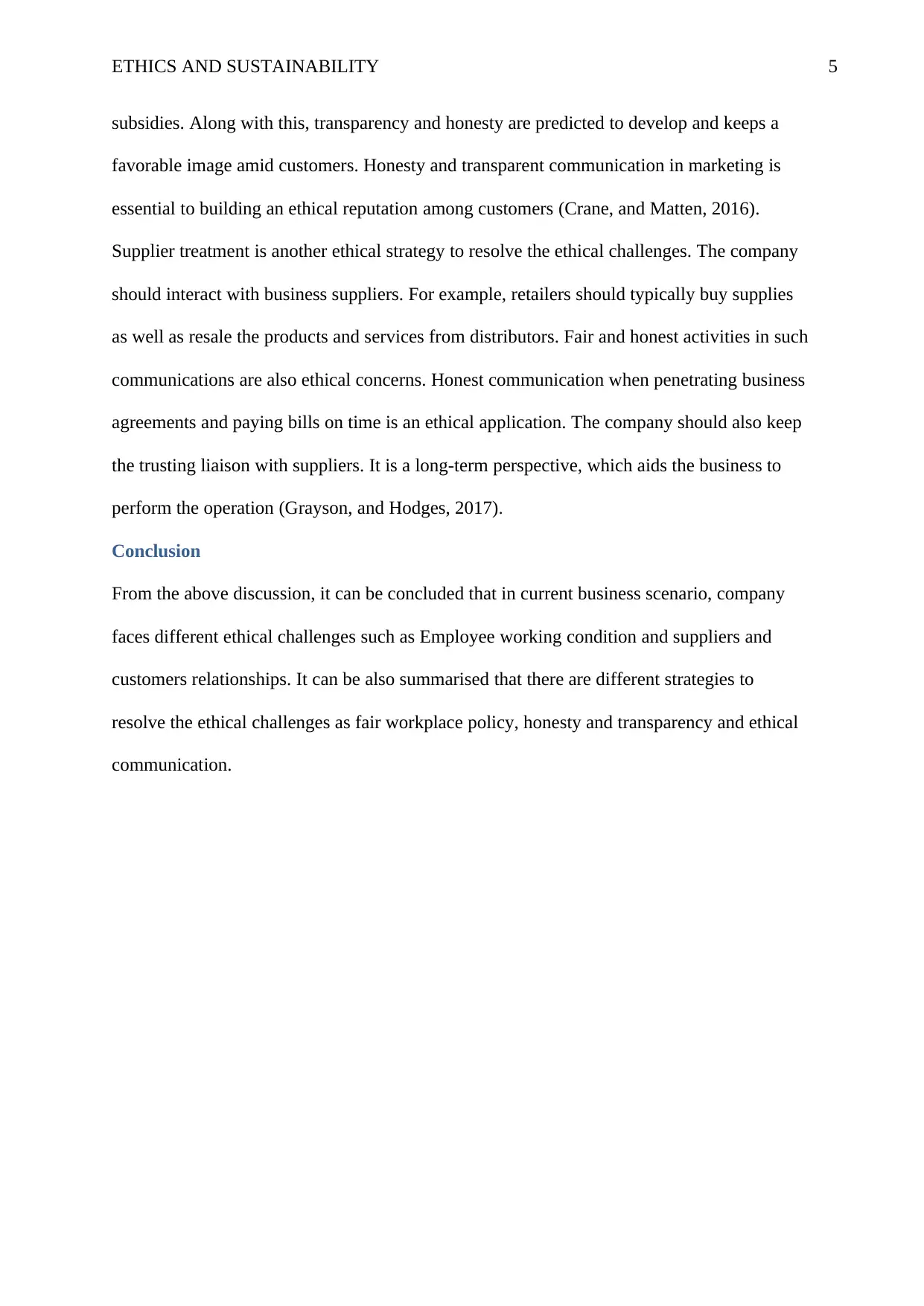
ETHICS AND SUSTAINABILITY 5
subsidies. Along with this, transparency and honesty are predicted to develop and keeps a
favorable image amid customers. Honesty and transparent communication in marketing is
essential to building an ethical reputation among customers (Crane, and Matten, 2016).
Supplier treatment is another ethical strategy to resolve the ethical challenges. The company
should interact with business suppliers. For example, retailers should typically buy supplies
as well as resale the products and services from distributors. Fair and honest activities in such
communications are also ethical concerns. Honest communication when penetrating business
agreements and paying bills on time is an ethical application. The company should also keep
the trusting liaison with suppliers. It is a long-term perspective, which aids the business to
perform the operation (Grayson, and Hodges, 2017).
Conclusion
From the above discussion, it can be concluded that in current business scenario, company
faces different ethical challenges such as Employee working condition and suppliers and
customers relationships. It can be also summarised that there are different strategies to
resolve the ethical challenges as fair workplace policy, honesty and transparency and ethical
communication.
subsidies. Along with this, transparency and honesty are predicted to develop and keeps a
favorable image amid customers. Honesty and transparent communication in marketing is
essential to building an ethical reputation among customers (Crane, and Matten, 2016).
Supplier treatment is another ethical strategy to resolve the ethical challenges. The company
should interact with business suppliers. For example, retailers should typically buy supplies
as well as resale the products and services from distributors. Fair and honest activities in such
communications are also ethical concerns. Honest communication when penetrating business
agreements and paying bills on time is an ethical application. The company should also keep
the trusting liaison with suppliers. It is a long-term perspective, which aids the business to
perform the operation (Grayson, and Hodges, 2017).
Conclusion
From the above discussion, it can be concluded that in current business scenario, company
faces different ethical challenges such as Employee working condition and suppliers and
customers relationships. It can be also summarised that there are different strategies to
resolve the ethical challenges as fair workplace policy, honesty and transparency and ethical
communication.
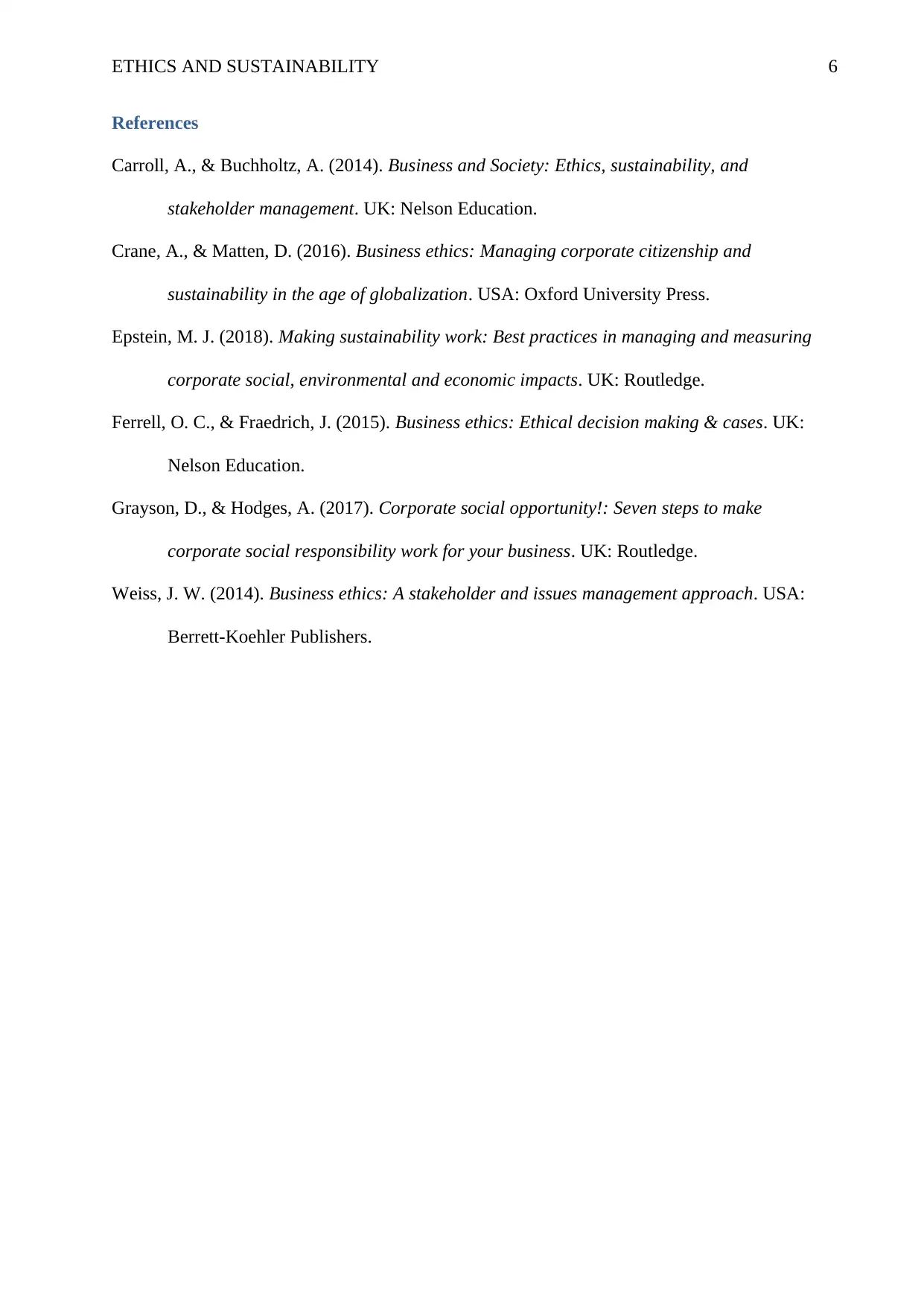
ETHICS AND SUSTAINABILITY 6
References
Carroll, A., & Buchholtz, A. (2014). Business and Society: Ethics, sustainability, and
stakeholder management. UK: Nelson Education.
Crane, A., & Matten, D. (2016). Business ethics: Managing corporate citizenship and
sustainability in the age of globalization. USA: Oxford University Press.
Epstein, M. J. (2018). Making sustainability work: Best practices in managing and measuring
corporate social, environmental and economic impacts. UK: Routledge.
Ferrell, O. C., & Fraedrich, J. (2015). Business ethics: Ethical decision making & cases. UK:
Nelson Education.
Grayson, D., & Hodges, A. (2017). Corporate social opportunity!: Seven steps to make
corporate social responsibility work for your business. UK: Routledge.
Weiss, J. W. (2014). Business ethics: A stakeholder and issues management approach. USA:
Berrett-Koehler Publishers.
References
Carroll, A., & Buchholtz, A. (2014). Business and Society: Ethics, sustainability, and
stakeholder management. UK: Nelson Education.
Crane, A., & Matten, D. (2016). Business ethics: Managing corporate citizenship and
sustainability in the age of globalization. USA: Oxford University Press.
Epstein, M. J. (2018). Making sustainability work: Best practices in managing and measuring
corporate social, environmental and economic impacts. UK: Routledge.
Ferrell, O. C., & Fraedrich, J. (2015). Business ethics: Ethical decision making & cases. UK:
Nelson Education.
Grayson, D., & Hodges, A. (2017). Corporate social opportunity!: Seven steps to make
corporate social responsibility work for your business. UK: Routledge.
Weiss, J. W. (2014). Business ethics: A stakeholder and issues management approach. USA:
Berrett-Koehler Publishers.
⊘ This is a preview!⊘
Do you want full access?
Subscribe today to unlock all pages.

Trusted by 1+ million students worldwide
1 out of 6
Related Documents
Your All-in-One AI-Powered Toolkit for Academic Success.
+13062052269
info@desklib.com
Available 24*7 on WhatsApp / Email
![[object Object]](/_next/static/media/star-bottom.7253800d.svg)
Unlock your academic potential
Copyright © 2020–2026 A2Z Services. All Rights Reserved. Developed and managed by ZUCOL.





